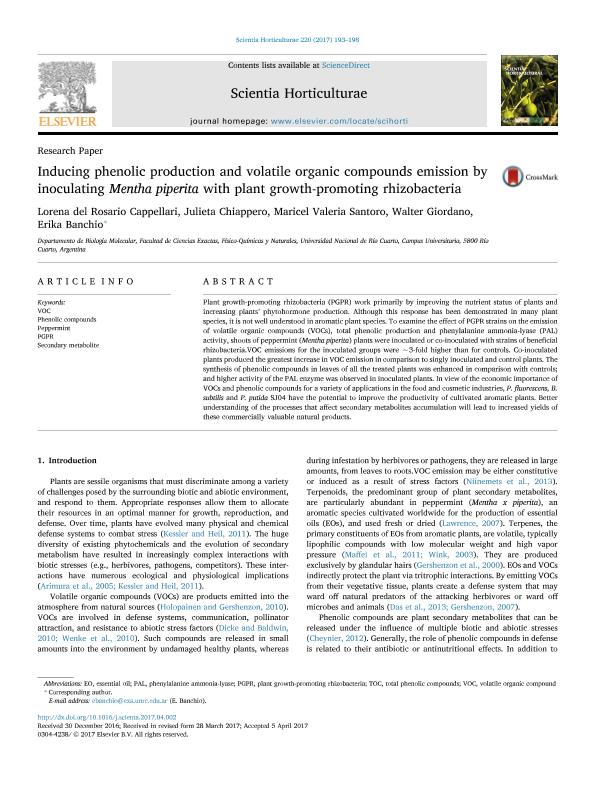Artículo
Inducing phenolic production and volatile organic compounds emission by inoculating Mentha piperita with plant growth-promoting rhizobacteria
Cappellari, Lorena del Rosario ; Chiappero, Julieta
; Chiappero, Julieta ; Santoro, Valeria Maricel
; Santoro, Valeria Maricel ; Giordano, Walter Fabian
; Giordano, Walter Fabian ; Banchio, Erika
; Banchio, Erika
 ; Chiappero, Julieta
; Chiappero, Julieta ; Santoro, Valeria Maricel
; Santoro, Valeria Maricel ; Giordano, Walter Fabian
; Giordano, Walter Fabian ; Banchio, Erika
; Banchio, Erika
Fecha de publicación:
06/2017
Editorial:
Elsevier Science
Revista:
Scientia Horticulturae
ISSN:
0304-4238
Idioma:
Inglés
Tipo de recurso:
Artículo publicado
Clasificación temática:
Resumen
Plant growth-promoting rhizobacteria (PGPR) work primarily by improving the nutrient status of plants and increasing plants’ phytohormone production. Although this response has been demonstrated in many plant species, it is not well understood in aromatic plant species. To examine the effect of PGPR strains on the emission of volatile organic compounds (VOCs), total phenolic production and phenylalanine ammonia-lyase (PAL) activity, shoots of peppermint (Mentha piperita) plants were inoculated or co-inoculated with strains of beneficial rhizobacteria.VOC emissions for the inoculated groups were ∼3-fold higher than for controls. Co-inoculated plants produced the greatest increase in VOC emission in comparison to singly inoculated and control plants. The synthesis of phenolic compounds in leaves of all the treated plants was enhanced in comparison with controls; and higher activity of the PAL enzyme was observed in inoculated plants. In view of the economic importance of VOCs and phenolic compounds for a variety of applications in the food and cosmetic industries, P. fluorescens, B. subtilis and P. putida SJ04 have the potential to improve the productivity of cultivated aromatic plants. Better understanding of the processes that affect secondary metabolites accumulation will lead to increased yields of these commercially valuable natural products.
Palabras clave:
PEPPERMINT
,
PGPR
,
PHENOLIC COMPOUNDS
,
SECONDARY METABOLITE
,
VOC
Archivos asociados
Licencia
Identificadores
Colecciones
Articulos(CCT - CORDOBA)
Articulos de CTRO.CIENTIFICO TECNOL.CONICET - CORDOBA
Articulos de CTRO.CIENTIFICO TECNOL.CONICET - CORDOBA
Citación
Cappellari, Lorena del Rosario; Chiappero, Julieta; Santoro, Valeria Maricel; Giordano, Walter Fabian; Banchio, Erika; Inducing phenolic production and volatile organic compounds emission by inoculating Mentha piperita with plant growth-promoting rhizobacteria; Elsevier Science; Scientia Horticulturae; 220; 6-2017; 193-198
Compartir
Altmétricas



